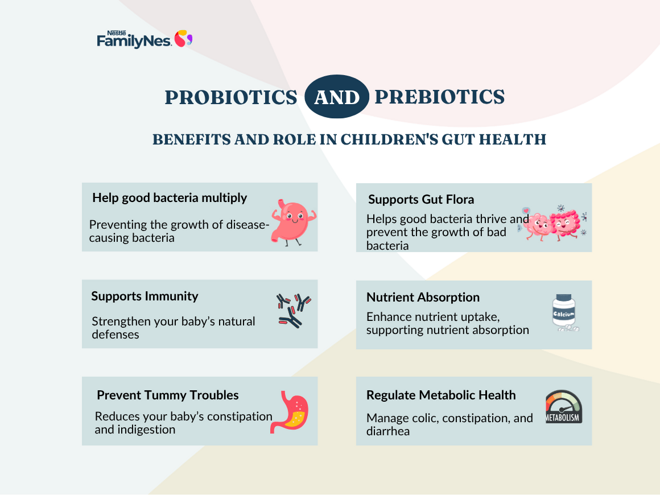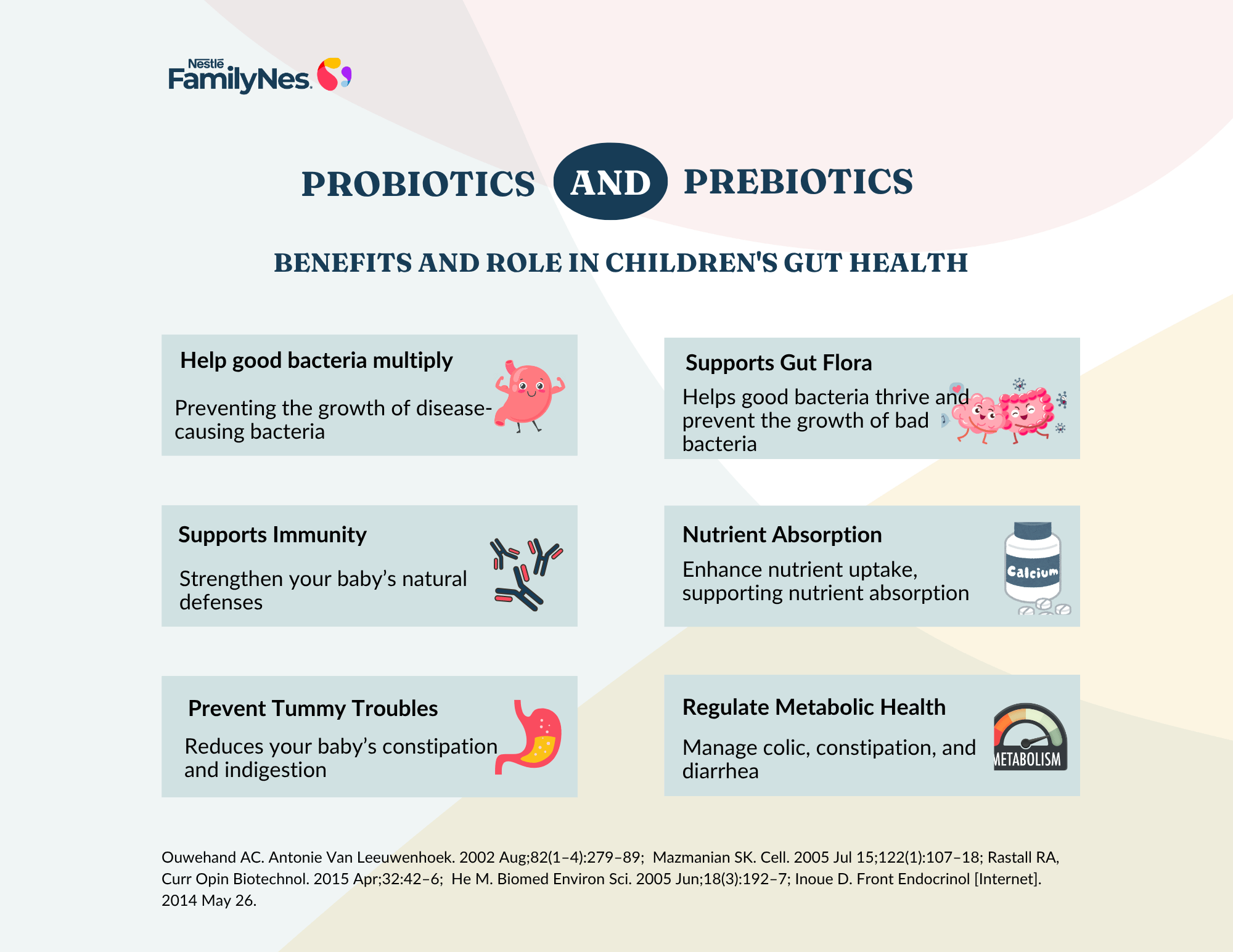
Understanding Baby's Gut Health: What are Probiotics and Prebiotics and their role in baby's well-being
Your baby’s smile reflects their happiness, and a healthy tummy plays a big role in it! A well-balanced gut not only supports digestion but also supports immunity, mood, behavior, sleep, and contributes to long-term health. From birth, your baby’s tummy houses millions of tiny bacteria, both good and bad, that help them grow strong. The baby is exposed to these bacteria during delivery, in the hospital environment, etc. These bacteria also evolve in number and diversity as the baby grows.1
Did you know that your breast milk is like a magic potion for your baby’s tummy?
It’s packed with nutrients and beneficial bacteria that help shape their gut health. As you breastfeed, the bacteria in your milk gets transferred to baby, supporting baby’s digestion, immunity, mood, behaviour, sleep, and overall growth. Breastfeeding not only nourishes your little one but also helps build a strong and healthy gut for the future!2
What else can make their gut more diverse?
Prebiotics and Probiotics. You must have heard about them somewhere. But let us just give you a quick brief.
Prebiotics and probiotics work together to keep your little one’s gut healthy. Prebiotics are food for beneficial bacteria, helping them grow, while probiotics are live bacteria that support digestion, immunity, and mood and behaviour.2, 3 Together, they create the fine balance of good and bad bacteria for a strong, trouble-free tummy.
Did you know? Prebiotics and probiotics are present in breast milk.
Mother’s milk is nature’s perfect blend of prebiotics and probiotics, specially made for your baby! Human Milk Oligosaccharides (HMOs) act as prebiotics, feeding good bacteria like Bifidobacterium, while probiotics such as Lactobacillus help with digestion and immunity. If breastfeeding isn’t an option, scientifically adapted formula containing prebiotics and probiotics could be an alternative to support your baby’s tummy health and overall well-being!
Let’s explore how these tiny helpers give your baby the best start in life!
How Do Prebiotics & Probiotics Benefit Your Baby?
Prebiotics – The Food for Good Bacteria:
- Help good bacteria multiply and prevent the growth of disease-causing bacteria.
- Supports Immunity: Strengthen your baby’s natural defenses5
- Prevent Tummy Troubles: Reduce constipation, indigestion, 6
Probiotics – The Good Bacteria:
- Supports gut Flora: Helps good bacteria thrive and prevent the growth of disease-causing bacteria4
- Supports Nutrient Absorption
- Prevents tummy troubles and manages colic, constipation, diarrhea, etc.
Together, they help keep the balance of good and bad bacteria, which is essential for the healthy state of the body!

Can You Give Probiotic Supplements to Your Babies?
Yes, babies can take probiotic supplements but always consult a pediatrician first! Probiotics, especially Lactobacillus reuteri, support gut health, prevent and reduce colic, and help manage diarrhea caused by infections or antibiotics. However, extra caution is needed for premature or immune-compromised babies. Always consult a pediatrician before offering it to your baby.
Key Takeaways:
- The gut is an important part of a baby’s body. It influences multiple aspects of health.
- Bacteria in the gut does two-way cross talks with the brain, bones, and sleep and influences its development
- Breastmilk naturally provides both these prebiotics and probiotics, making it the perfect choice for infants
- Probiotics are important for maintaining a balance of good & bad bacteria in the gut, and they also help in digestion, support immunity, and prevent and reduce colic, constipation, and diarrhoea
- Prebiotics support gut flora, supporting the overall gut health
- Always consult your pediatrician before providing probiotic supplementation to your baby.
Watch your little one grow happy and healthy with the power of probiotics and prebiotics! A well-nourished tummy means better digestion, stronger immunity, and a joyful, thriving baby.
This content is not a substitute for professional medical advice. Please consult your healthcare professional
References
- Bharadia L, Agrawal N, Joshi N. Development and Functions of the Infant Gut Microflora: Western vs. Indian Infants. Int J Pediatr. 2020 May 7;2020:7586264.
- Prebiotics in New-Born and Children’s Health [Internet]. [cited 2025 Feb 22]. Available from: https://www.mdpi.com/2076-2607/11/10/2453
- Urbańska M, Szajewska H. The efficacy of Lactobacillus reuteri DSM 17938 in infants and children: a review of the current evidence. Eur J Pediatr. 2014;173(10):1327–37.
- Rastall RA, Gibson GR. Recent developments in prebiotics to selectively impact beneficial microbes and promote intestinal health. Curr Opin Biotechnol. 2015 Apr;32:42–6.
- Mazmanian SK, Liu CH, Tzianabos AO, Kasper DL. An Immunomodulatory Molecule of Symbiotic Bacteria Directs Maturation of the Host Immune System. Cell. 2005 Jul 15;122(1):107–18.
- Inoue D, Tsujimoto G, Kimura I. Regulation of Energy Homeostasis by GPR41. Front Endocrinol [Internet]. 2014 May 26 [cited 2025 Feb 22];5. Available from: https://www.frontiersin.org/journals/endocrinology/articles/10.3389/fendo.2014.00081/full
- He M, Yang YX, Han H, Men JH, Bian LH, Wang GD. Effects of yogurt supplementation on the growth of preschool children in Beijing suburbs. Biomed Environ Sci. 2005 Jun;18(3):192–7.


